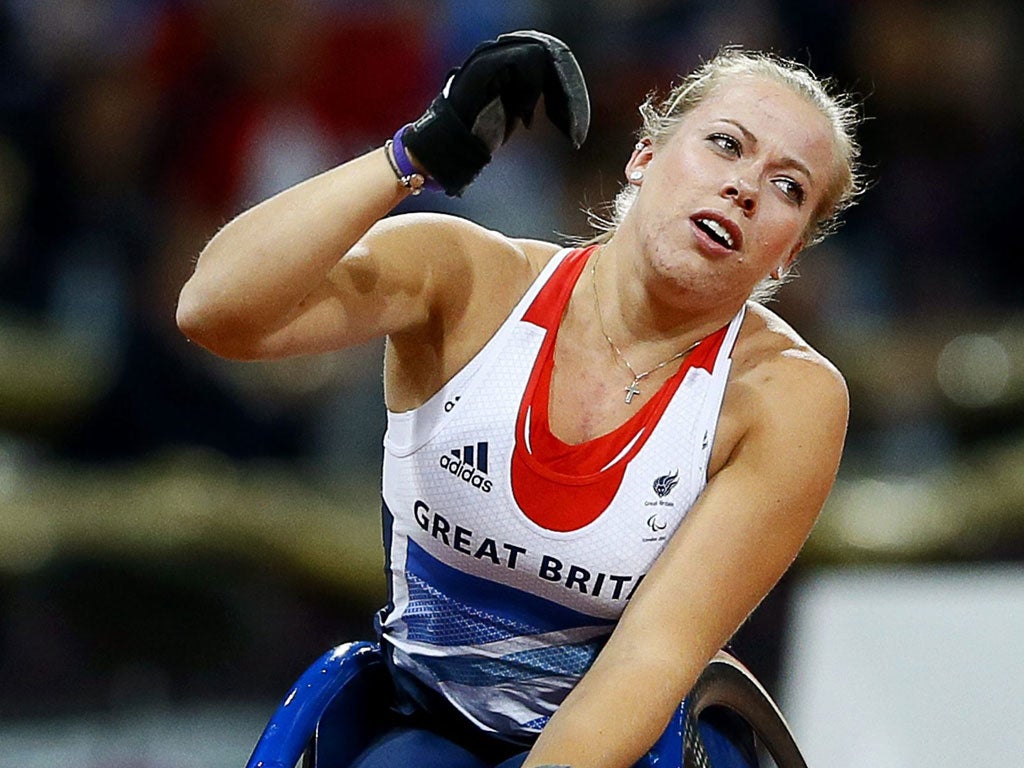Athletics: 'Hurricane Hannah' blows away her rivals to claim sprint glory

Your support helps us to tell the story
From reproductive rights to climate change to Big Tech, The Independent is on the ground when the story is developing. Whether it's investigating the financials of Elon Musk's pro-Trump PAC or producing our latest documentary, 'The A Word', which shines a light on the American women fighting for reproductive rights, we know how important it is to parse out the facts from the messaging.
At such a critical moment in US history, we need reporters on the ground. Your donation allows us to keep sending journalists to speak to both sides of the story.
The Independent is trusted by Americans across the entire political spectrum. And unlike many other quality news outlets, we choose not to lock Americans out of our reporting and analysis with paywalls. We believe quality journalism should be available to everyone, paid for by those who can afford it.
Your support makes all the difference.Nothing could stop "Hurricane Hannah" in the home straight of the London 2012 track and field arena last night. With a few powerful turns of her wheels, and an irresistible gust of speed, Britain's Hannah Cockcroft blasted to the first gold medal on the track in the Paralympics athletics programme last night.
Roared on by an 80,000 sell-out crowd, the 20-year-old from Halifax pulled clear of her rivals in the T34 100m final to win in 18.06sec, slicing 0.18sec off the Paralympic record she had clocked in her morning heat.
It was a victory every bit as stunning as those achieved on the Olympic track and field schedule by Jessica Ennis, Mo Farah and Greg Rutherford – and rightly hailed with a similarly deafening decibel count.
"The noise was a little mind blowing," Cockcroft said. "It was really scary. It's just a lot of people, who were all expecting me to do what I have just done.
"It was incredible. I knew deep down I could beat all the girls. I'm just happy I managed to nail it."
She did that, finishing comfortably clear of her closest pursuer, Amy Siemons of the Netherlands, the runner up in 19.49sec.
In doing so, the young Yorkshirewoman completed a journey that started when she was discovered at a talent day in Loughborough five years ago by Ian Thompson, the husband and coach of Tanni Grey-Thompson.
Cockcroft, who has cerebral palsy, will be looking to emulate Usain Bolt later in the week and complete a sprint double. On Thursday she will be going for another gold in the 200m – on the trusty wheelchair she calls "Sally."
The Hurricane was not the only British athlete to feel the force of the home crowd on the opening day of track and field competition. "I heard a lot of the Olympic guys talk about it, but you cannot actually imagine how electric it is out there," Aled Davies said. The East End electricity helped to power the 21-year-old Welshman to bronze in the F42/44 shot put, a secondary event for the discus specialist.
"The atmosphere was incredible," Davies added. "As soon as I came out of that tunnel, the whole stadium erupted. They did not know who I was but I was competing for Great Britain and everyone just started screaming. It was like, 'Wow! It's here. Let's do it.
"I actually had to slow down my technique and go at 75 per cent effort because the crowd was carrying me so much. When I was giving it 100 per cent, I just couldn't control the shot. You saw that in the first couple of rounds. I had to chill out, because that atmosphere had my heart pounding and my adrenalin was going through the roof."
A third-round effort of 13.78m was the best of a six-throw series that earned Davies third place behind Jackie Christiansen of Denmark (18.16m) and Darko Kralj of Croatia (14.21m).
"I can't believe it," he said. "The shot put is my second event. I really wanted to go out there and do the team proud but I didn't expect a medal. I'm overwhelmed."
For many of the athletes, just making it to the Games has been a victorious achievement.
Private Derek Derenalagi was pronounced dead when the army vehicle in which he was travelling in Afghanistan was blown up by two Taliban bombs in 2007.
Like Mark Twain, reports of his demise proved premature. Five years on, the 37-year-old amputee was throwing the discus for Britain in the T57-58 category last night. He finished 11th in 39.37m but received just as raucous a reception as Hurricane Hannah.
Join our commenting forum
Join thought-provoking conversations, follow other Independent readers and see their replies
Comments